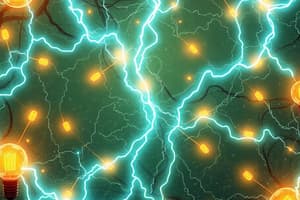Podcast
Questions and Answers
What does electric current specifically refer to?
What does electric current specifically refer to?
- The voltage generated by charged particles
- The flow of charged particles through conductors (correct)
- The energy carried by charged particles
- The movement of electrons along wires
How is electric current analogized in the text?
How is electric current analogized in the text?
- As water flowing out of a faucet (correct)
- As sunlight shining through a window
- As air circulating in a room
- As water freezing into ice
What determines the amount of charge per unit time that reaches each part of the path?
What determines the amount of charge per unit time that reaches each part of the path?
- Magnetic force
- Voltage
- Gravity
- Amperage (correct)
In the context of electricity, what is meant by 'current'?
In the context of electricity, what is meant by 'current'?
How does increasing the switch opening in a circuit affect the flow of current?
How does increasing the switch opening in a circuit affect the flow of current?
What pushes electrons further around the loop in an electric circuit?
What pushes electrons further around the loop in an electric circuit?
Study Notes
Electricity is a form of energy that is used by virtually everyone in their daily lives. It powers our homes, offices, and vehicles, enabling us to communicate with one another through computers, smartphones, and televisions. At its core, electricity involves the movement of electrons along wires from point A to B. This basic concept can help you understand how your home's electrical system works as well as other systems like those found in power stations.
Electric current refers specifically to the flow of charged particles such as protons and neutrons traveling through conductors like copper wire from one place to another. These charged particles carry energy which makes up the voltage that drives them forward. How fast they travel determines how much charge per unit time reaches each part of its path, known as amperage. So when we say there is "current," it means that these charges are moving, carrying energy along with them.
A common analogy describes electric current as water flowing out of a faucet. Just as more water flows out if the tap opens wider, so too does more current flow if the switch opening in a circuit gets bigger. Likewise, just as gravity pulls a bucket towards ground level, so do some forces push against electromagnetic fields generating magnetic forces pulling objects together. In terms of circuits, this would mean pushing the electrons further around the loop, increasing the strength of the current.
Understanding these basics helps us appreciate what happens when different parts are connected into larger systems—like those found within households or cities. When a light bulb turns off due to insufficient power supply, an engineer might look at whether enough electric current was available at both ends; if it wasn’t, she would know where they needed to make adjustments. Knowing these fundamentals also helps users keep safe while working with electricity since risks arise whenever things go wrong with these fundamental principles in play. By understanding electricity and electric current, we better grasp the essentials of how technology works today, making us safer technicians or consumers of technology.
Studying That Suits You
Use AI to generate personalized quizzes and flashcards to suit your learning preferences.
Description
Test your knowledge on the basics of electricity and electric current, including concepts such as electron movement, voltage, amperage, and circuit behavior. This quiz will help you understand how electricity powers our daily lives and how electric current flows through conductors to carry energy.




